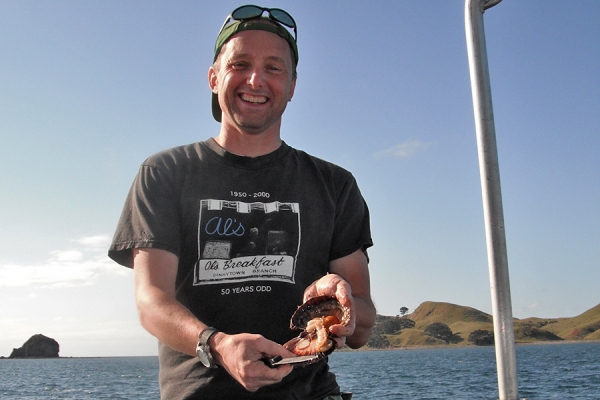 Prof. Dennis Higgs holds a scallop drawn from the coastal waters of New Zealand.
Prof. Dennis Higgs holds a scallop drawn from the coastal waters of New Zealand.
UWindsor integrative biology professor Dennis Higgs, in collaboration with a marine scientist in New Zealand, has received a $150,000 grant from that country’s government to help assess the health and welfare over the next three years of the New Zealand snapper (Chrysophrys auratus), a fish found in surrounding seas.
The New Zealand government has invited expert scientists as part of its three-year International Leadership Fellowship program to investigate the health of the North Island marine reserves: protected patches of ocean with strict fishing regulations or no fishing at all to rejuvenate the fish populations.
“The New Zealand snapper is a popular recreational fish and a sacred fish to the indigenous peoples,” says Dr. Higgs.
“I’m collaborating with Craig Radford from the University of Auckland, a recognized expert in marine reserves and fish responses that works and lives on one of the first marine reserves established in the world.”
The team will divide its time among various reserves around the North Island. Members will compare results of fish populations in reserves of varying ages, from 30-years-old to one-year-old to currently unprotected.
“While it is known that these protections can increase numbers of fish and increase overall biodiversity, we do not know how long it takes for protections to have an impact nor do we know if these protections reduce overall fish stress or improve fish health,” says Higgs.
“Radford is interested in looking at marine reserves that were established from different time periods and seeing if the fish are stressed, if they are healthy, and to see how long it takes for a reserve to be established before improvements in fish and ecosystem health are seen.”
The team will examine behavioural responses of fish to man-made stressors, especially underwater noise, as well as the expression of genes known to be important to fish stress responses and overall fish health.
“Marine reserves are excellent for protecting the marine environment from the majority of anthropogenic activities, namely fishing,” he says.
“However, what they don’t protect the marine fauna from is anthropogenic noise, as the public are encouraged to visit and use these protected areas for recreational activities, such as snorkelling and diving.”
Behavioural methods will include the use of baited underwater video and underwater speakers to replay the boat sound.
“We’ll deploy underwater cameras to monitor fish in real time,” says Higgs.
“You can deploy these things, anchor the camera, drop them off a boat, and let them go for a week at a time and go back and collect the footage of what the fish do when we are not around.”
Radford and Higgs will catch the fish and take a thin clipping from their fins. Genetic data will then be extracted from the fin clips and assessed for expression of known stress genes for fish, to measure the degree of stress present in snapper both before and after boat sound presentations.
“I will analyze fish genes because they express differently depending on stress levels — you can directly measure fish health by what genes are expressed,” Higgs says.
“By coupling the behavioural and genetic markers of stressors we will be able to measure the effects of anthropogenic influences on fish resident in each reserve type and the ability of fish to habituate to noise stressors.”
The fin clipping is comparable to taking a fingernail clipping, says Higgs, and the fish will be unharmed and released back into the reserve.
“We were focused on not killing the fish to study it in part because the snapper is sacred to some of the indigenous populations of Māori people, especially the local iwi (tribe) the Ngāti Manuhuri,” says Higgs.
“We’ll be partnering with them to address their concerns as they are interested in ecosystem protection.”
Higgs receives $150,000 for the three-year study, which includes working with schoolchildren and educating them on the importance of fish. A PhD student from his lab will join the project.
